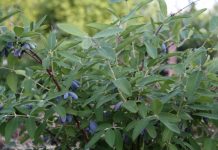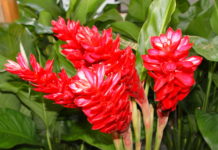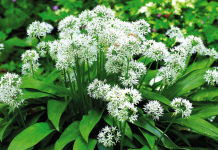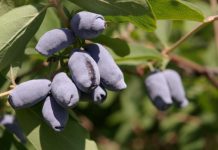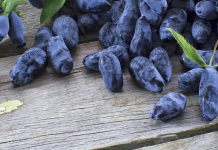Vegetables with annual cultivation can quickly deplete the land. Therefore, the soil should be enriched with microelements useful both for plants and for humans. To increase productivity and improve your garden, you should use potassium sulfate, this is one of the most important fertilizers. It is suitable for almost all vegetable and garden crops.
Material Content:
What is potassium sulfate fertilizer?
Potassium sulfate (potassium sulfate) is a crystalline powder of a light yellow tint. This substance was discovered over a hundred years ago, and has long been successfully used as fertilizer.
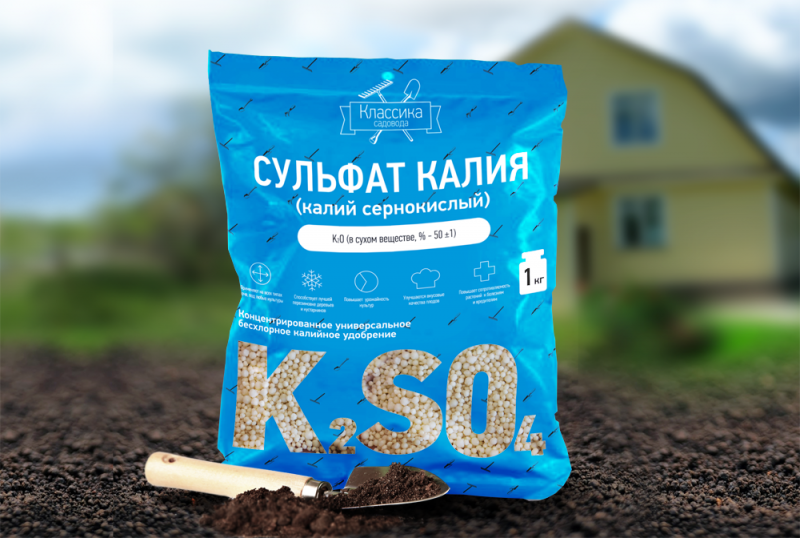
Potassium sulfate is obtained industrially from natural materials. The raw materials are the minerals langbainite and Shenit.
Potassium sulfate is soluble in water, so it can be applied to the soil both in powder form and in solution.
The composition of the substance includes several components at once. In this case, directly potassium contains more than fifty percent.
In addition, there are:
- Calcium;
- Iron;
- Sodium;
- Arsenic.
Chlorine in the fertilizer is completely absent, therefore, potassium sulfate is not dangerous for the soil, plants and the environment. On the contrary, it balances the acid-base balance of almost any soil. However, it works best on acidic soils.
Useful properties for plants
Potassium supports plant growth, their health and well-being. It has a great influence on the process of fruit development.Therefore, the presence of this element in the soil is of great importance for agriculture.
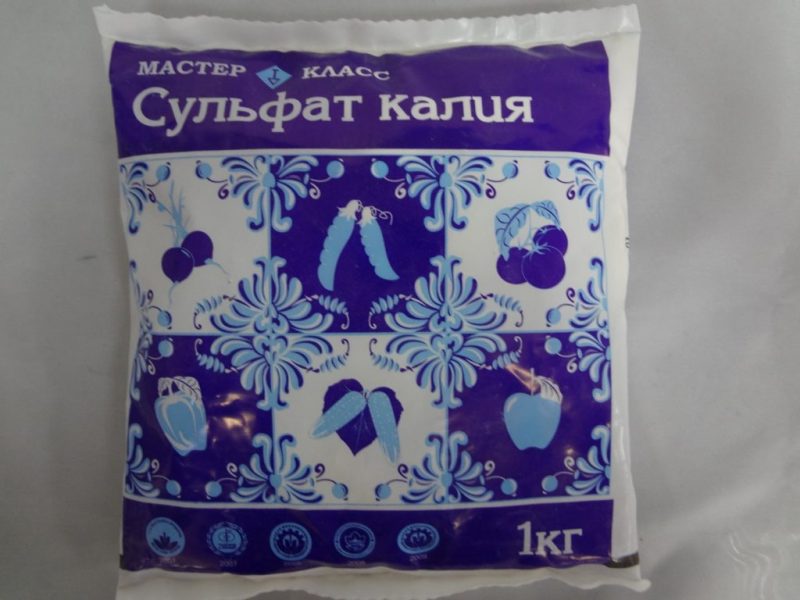
Potassium has the following beneficial effects:
- Increases the immunity of all cultivated plants, increases their resistance to diseases and pests.
- Participates in cellular metabolism, it is indispensable for many processes occurring in the plant body.
- This is one of the most important substances that affect photosynthesis, which actively contributes to the conservation of green mass even in the most adverse weather conditions.
- With its help, there is a synthesis of organic acids, vital for plants.
- Normalized nitrogen and carbohydrate metabolism - helps the synthesis of sugars, starch.
- This substance stimulates the circulation of water inside the plant, due to which the nutrients absorbed by the roots from the soil safely reach the leaves and fruits, helping to survive the lack of moisture.
- Enhances fruiting.
- Fruits are saturated with useful substances and vitamins, which is very important for a healthy diet of people and animals.
- It helps the development of the root system.
- Potassium helps plants successfully survive the winter, well tolerate low ambient temperatures.
Fertilizer potassium sulfate is the most suitable chemical substance for enriching the soil with potassium, since it does not adversely affect the environment.
What crops is suitable
Potassium sulfate as a fertilizer is perfect for almost all crops, including fruit and garden crops. It is indispensable for floriculture.
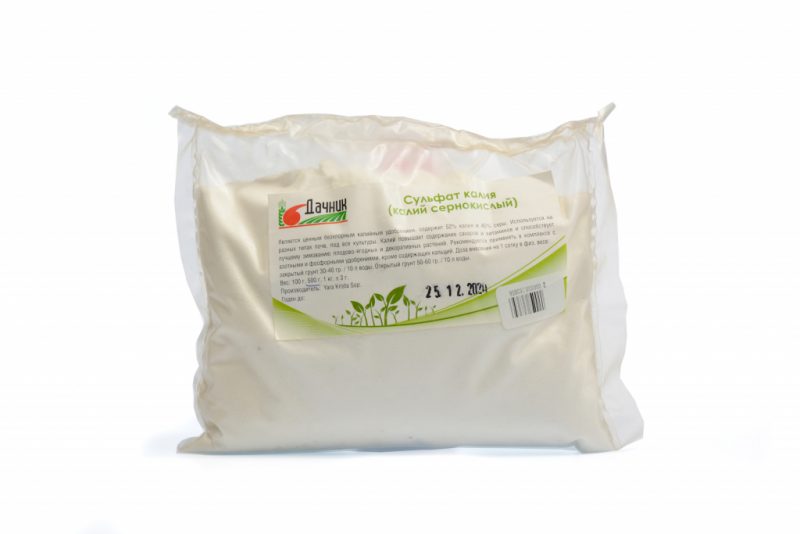
It is used on almost all soils - from sandy and red soils, to floodplain and peat bog soils. Potassium sulfate is also good for chernozems, however, on condition of moderate use. Especially calcareous soils need it, since plants growing under such conditions absorb potassium very hard. But solonetzic soil does not need potassium sulfate, because they have enough natural content of potassium compounds.
Vegetable crops
Potassium sulfate helps increase the yield of garden crops. It is perfect for a wide variety of vegetables - cucumbers, radishes, tomatoes, cabbage, bell peppers, eggplant. Fertilizer must be applied during the preparation of the beds for planting seedlings.
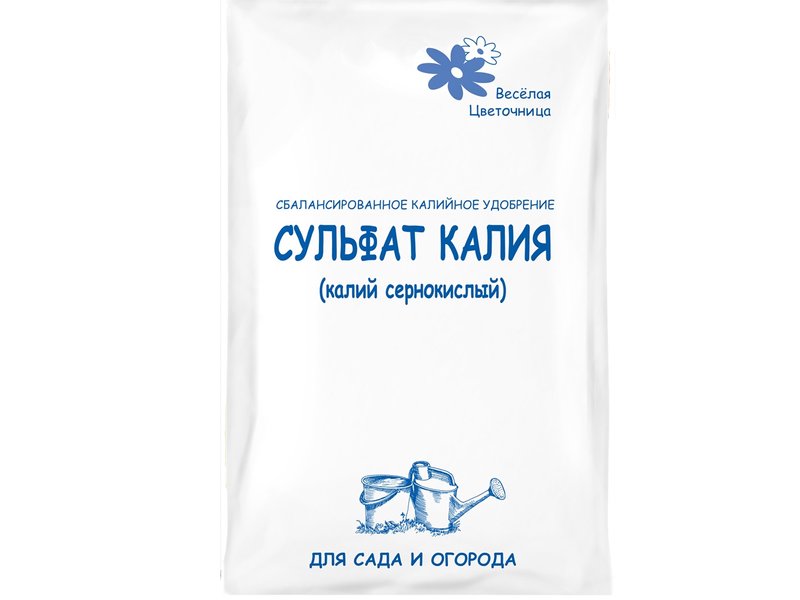
Root crops also perceive potassium sulfate. It is also necessary for salad, greens.
Fruit trees
Fruit trees must be fertilized with potassium sulfate during planting or transplanting. Fertilizer can be used in spring and autumn, introducing it into the soil around the trunk. This will help not only increase the quantity and quality of fruits, but also increase the frost resistance of trees in winter.
Berry bushes
Berry crops respond well to potash fertilizers. Therefore, they are used in the spring, before and during the flowering of berry bushes.
Strawberries and strawberries are also fertilized at the time of flowering.
Grapes need to be “fed” with potassium every year, because this plant absorbs this trace element more than others. This should be done in the spring, in cloudy weather.
Flower crops
Potash fertilizers are an excellent top dressing for roses. Potassium sulfate is used in spring, when plants only wake up from hibernation. During flowering, another fertilizer is already used - potassium nitrate.
Potassium sulfate is great for indoor plants. It is necessary to enrich the soil in pots with potassium annually for better flowering and growth of green mass.
Instructions for use potassium sulfate
Potassium sulfate can be used in three different ways, each of them is very effective.
Dry potassium sulfate is introduced during soil preparation for planting and digging. At the same time, fertilizer must be mixed well with the ground. This method is suitable for the beginning of garden work in the spring and when they are completed in the fall.
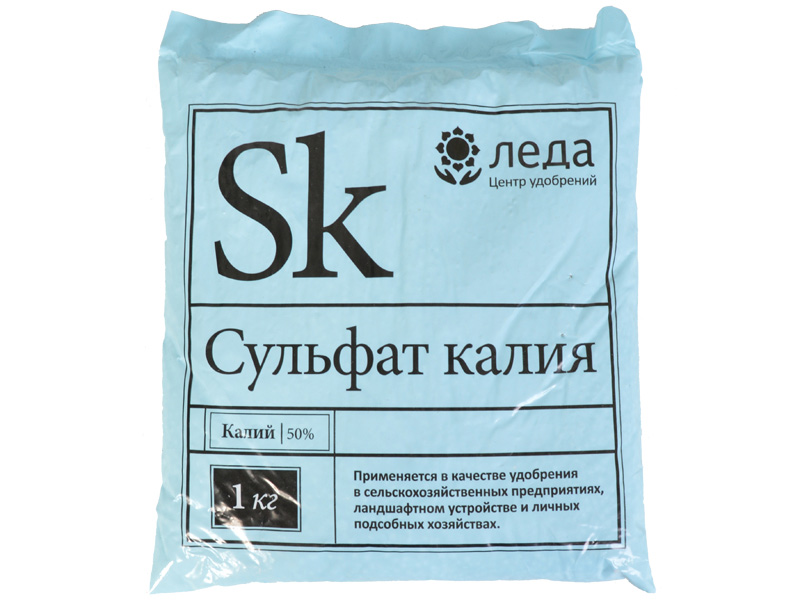
Another way is to dissolve the fertilizer in water, and so With a solution, water the plants under the root system. This technology can be used during flowering or in autumn, preparing your garden for winter. In the garden, a layer of earth is usually raised to a depth of about 10 cm and watered with a solution. Near fruit trees, deepenings are made vertically or at an angle of forty-five degrees and liquid fertilizer is poured into them.
The third method is used during flowering, it is also very effective. Potassium sulfate is dissolved in water and the green mass is sprayed with it. This method is completely safe for human health and the environment, as potassium sulfate is completely non-toxic.
Fertilization time
Typically, potassium sulfate enrich the soil before embarking on planting vegetables, planting seedlings or seedlings.
The vegetative period is very important for plants; they need such a rather difficult moment for them to be fed with mineral substances. And here it is quite appropriate to apply potassium sulfate.
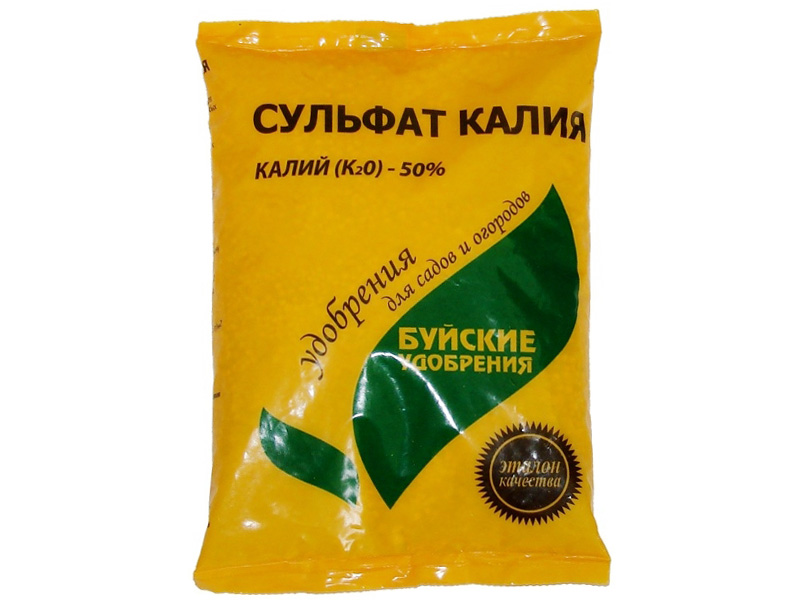
In summer, when plants experience stress from the hot sun, it is also perfectly acceptable to support them with potash fertilizer. However, it should be remembered that feeding should be completed two weeks before harvesting.
In autumn, potash fertilizers for plants will be necessary in order to successfully survive the winter. This is especially important for those climatic zones where severe frosts occur.
Potassium sulfate is part of some universal fertilizers. And this is very convenient, since it will not be necessary to apply each fertilizer separately. However, it should be borne in mind that not all chemicals used to feed plants are well combined with each other. therefore it’s better to use purchased ready-made mixes rather than experimenting with different additives. Since, for example, urea and chalk enter into chemical reactions with potassium sulfate, which can adversely affect the state of soil and plants. Therefore, you need to make them separately and at different times.
Dosage
The use of potassium sulfate for various horticultural crops in the following dosage:
- fruit trees - about 200 grams for each tree or planting pit;
- root vegetables and cabbage - 30 grams per square meter;
- berry - up to 20 grams per square meter;
- garden crops (tomatoes, cucumbers, eggplant, etc.) - up to 20 grams per square meter;
- flowers, including indoor - 15 grams per square meter.
Pros and cons of using fertilizer
Potassium sulfate perfectly restores the nutritional properties of the soil, has a positive effect on plants. This substance is not able to harm the environment, beneficial pollinating insects, animals. It is safe for humans, provided that the correct technology for fertilizing the soil is observed. When compared with other substances, then potassium sulfate as the safest agent is much more preferable.
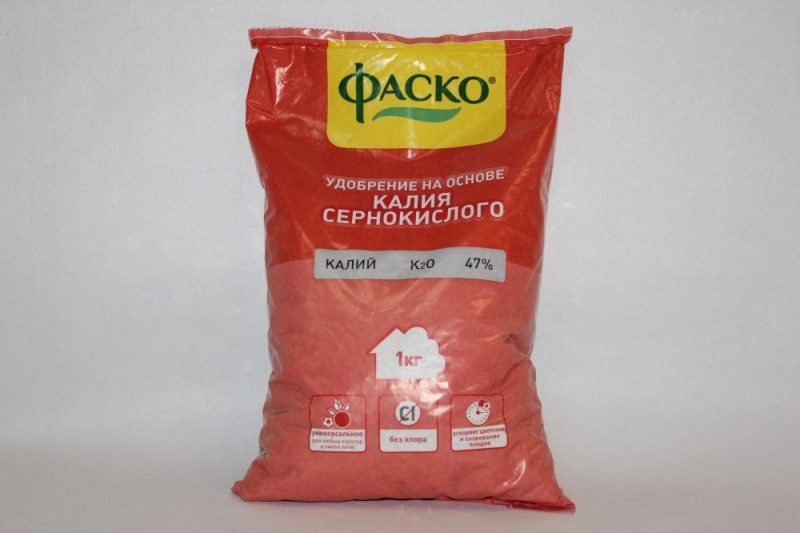
The drawbacks of this fertilizer are practically nonexistent. Since ancient times, people used wood ash to enrich the soil, which is also a source of potassium. Sometimes this method is used now, but rarely. Since today very few households use only firewood for heating houses and specially collect ash all winter for use as fertilizer in their personal garden or garden plot. But in large farms this method is completely unacceptable.
Potassium sulfate is similar in safety to ash, however, its potassium content is much higher. In addition, this substance is highly soluble in water, unlike ash. And therefore it is perfectly absorbed into the earth, better enriches the soil.
Safety Precautions and Storage of Potassium Sulphate
Potassium sulfate should be stored in a dry place. Packaging must be tightly sealed. If storage conditions are not violated, then it will be possible to use the fertilizer for several years in a row, its useful properties are not lost. In addition, potassium sulfate powder does not have the property of caking, so it will be easy to apply, even after years.
Potassium sulfate is non-toxic and non-combustible therefore its transportation is completely safe.
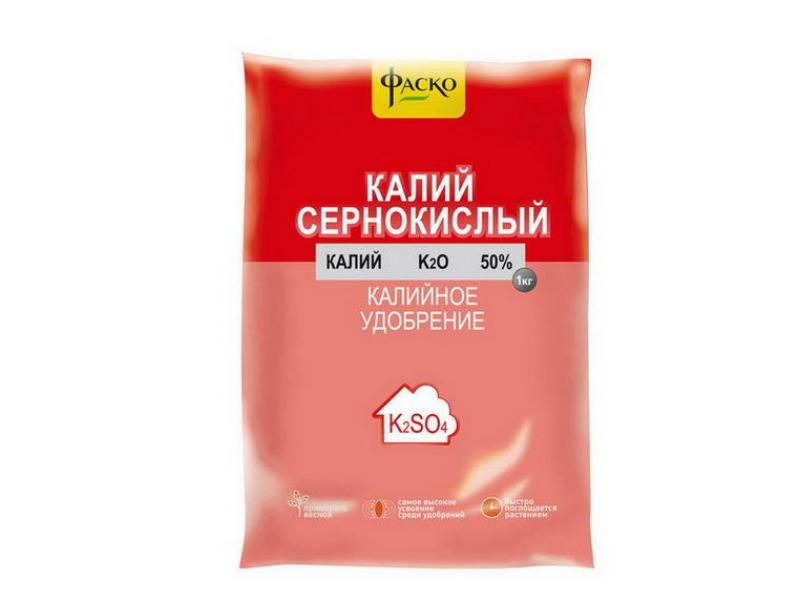
Although there have been no recorded cases of poisoning with potassium sulfate, caution should be exercised in its use. After all, if this substance accidentally gets into the eyes, nose or on the mucous membrane of the mouth, it will cause serious irritation.
Therefore, you need to eliminate this possibility, Never inhale potassium sulfate dust. - Be sure to wear gloves and a respirator before opening the packaging and starting to work with fertilizer. Additionally, you can use safety glasses. In extreme cases, do not touch your face with contaminated gloves, especially in the eye area.
Fertilizer must be made inaccessible to children and animals. Careless safety can lead to serious consequences.


